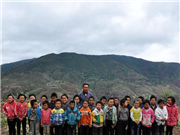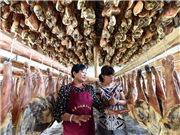

(4) Budgets for social security funds
The budget for revenue of social security funds is prepared taking into account factors including the implementation of the previous year’s revenue budget, forecasted economic and social development for the current year, adjustments in social security policies, and plans for work related to social security.
Revenue from insurance premiums is budgeted on the basis of factors including the number of people paying contributions, insurance rates or fixed premium standards, the average pay rate from the previous year, and pay increases. The budget is then determined by combining these factors with the expansion of insurance coverage, the recovery of payment arrears, and so on.
Revenue from government subsidies is budgeted based on government subsidies to social security funds in the previous year and newly added government subsidies in the current year after adjusting for incomparable factors.
The budget for expenditure from the social security funds is prepared taking into consideration factors such as the implementation of the previous year’s expenditure budget, projected changes to the number of people covered by the social security schemes and forecasted economic and social development for the current year, and adjustments in social security policies as well as changes in the benefits paid out from social security funds.
The revenue of social security funds is estimated to reach 4.308807 trillion yuan nationwide, up 10% over the previous year, including 3.163339 trillion yuan from insurance premiums and 974.175 billion yuan from government subsidies. Nationwide, the expenditure from social security funds will reach 3.846397 trillion yuan, up 14.2% over the previous year. With an estimated surplus of 462.41 billion yuan this year, the year-end balance is projected to reach 5.503286 trillion yuan after the balance from 2014 has been rolled over.
It should be noted that according to the revised Budget Law, after the beginning of a new financial year and before the approval of the draft central government budgets by the National People’s Congress, arrangements may be made for the following expenditures:
-carryover expenditures from the previous year;
-basic expenditures of government departments, project expenditures, and transfer payments to lower-level governments that must be made in the current year, after referring to the amount of budgetary expenditures for the corresponding period of the previous year;
-expenditures for which payment constitutes a legally prescribed obligation; and
-expenditures to be used for dealing with natural disasters and other emergencies.
Based on the above stipulations, in January 2015, the central government made expenditures to the value of 751.2 billion yuan from the general public budget. This figure includes 132.9 billion yuan spent at the central level and 618.3 billion yuan in tax rebates and transfer payments made to local governments.
III. Properly Implementing the New Budget Law and Carrying Out the Work on Fiscal Reform and Development
1. Strengthening the legal framework for managing public finances
Study and training sessions and activities to inform about the newly revised Budget Law will be carried out to ensure that the guidelines, principles, and each specific provision of the law are thoroughly understood and the rule of law consciousness in budgetary work is strengthened. We will consciously follow the provisions of the Budget Law as our code of conduct as we exercise budgetary management, and perform our duties including managing the public finances in strict accordance with the law.
We will step up the intensity of work to revise the regulations on the enforcement of the Budget Law and improve systems such as the general transfer payments system according to the principles set in the Budget Law and its authorization.
We will coordinate the enforcement of the new Budget Law with fiscal and tax reforms, strengthening the links between concrete plans for fiscal and tax reforms and both the Budget Law and the building of institutions that support it.
In accordance with the plans for implementing the principle of law-based taxation, we will assist with legislative work on real estate tax, environmental protection tax, and tonnage tax, and actively promote the upgrading of existing interim tax regulations to laws. Our work regarding the revision of the Law on Tax Collection and Administration will be properly carried out.
2. Improving and strengthening macro-level regulation through fiscal policy
We will carry out timely and appropriate anticipatory adjustments and fine-tuning on the basis of ensuring the continuity and stability of our policies; place greater weight on making targeted measures based on the proper exercise of macro-regulation to keep the economy performing within an appropriate range; intensify efforts to carry out structural adjustments; prioritize the provision of support for areas of weakness; strike a balance between maintaining steady growth and restructuring; keep market expectations stable; prevent economic growth from slipping into a downward spiral; and create a good macro environment for ensuring steady economic development.
We will work actively to support efforts to discover and foster new areas of strong consumer activity that have huge market potential and great future prospects, improve and properly implement related fiscal and tax policies, promote information technology consumption, and stimulate the development of the elderly care, fitness, cultural, creative, and design industries.
We will advance reform of the investment and financing systems; make innovations in methods of investment and financing; move more quickly to launch projects that demonstrate the PPP model in urban infrastructure development, the public rental housing sector, and in business transformation of local government financing companies; and effectively unleash the potential of nongovernmental investment.
We will improve the policies and measures for boosting foreign trade, support increases in the export of technology, equipment, and services, cultivate new strengths to give us an advantage in foreign trade, and encourage increases in the import of advanced technology and equipment, key parts and components, and resources that China lacks.
We will work hard to improve the efficiency and quality of overseas investment, give impetus to the implementation of major projects for strengthening infrastructure connectivity with our neighboring countries, encourage international cooperation on advanced technology, and help competitive industries to step out onto the global stage.
 |  |
Day|Week

 Tsinghua junior makes over 10,000 yuan a day by selling alumnae's used quilts
Tsinghua junior makes over 10,000 yuan a day by selling alumnae's used quilts Graduation photos of students from Zhongnan University
Graduation photos of students from Zhongnan University A school with only one teacher in deep mountains
A school with only one teacher in deep mountains Glimpse of cultural heritage "Xilankapu"
Glimpse of cultural heritage "Xilankapu" Homemade cured hams in SW China
Homemade cured hams in SW China Breathtaking buildings of W. Sichuan Plateau
Breathtaking buildings of W. Sichuan Plateau Graduation photos of "legal beauties"
Graduation photos of "legal beauties" Top 10 most expensive restaurants in Beijing in 2015
Top 10 most expensive restaurants in Beijing in 2015